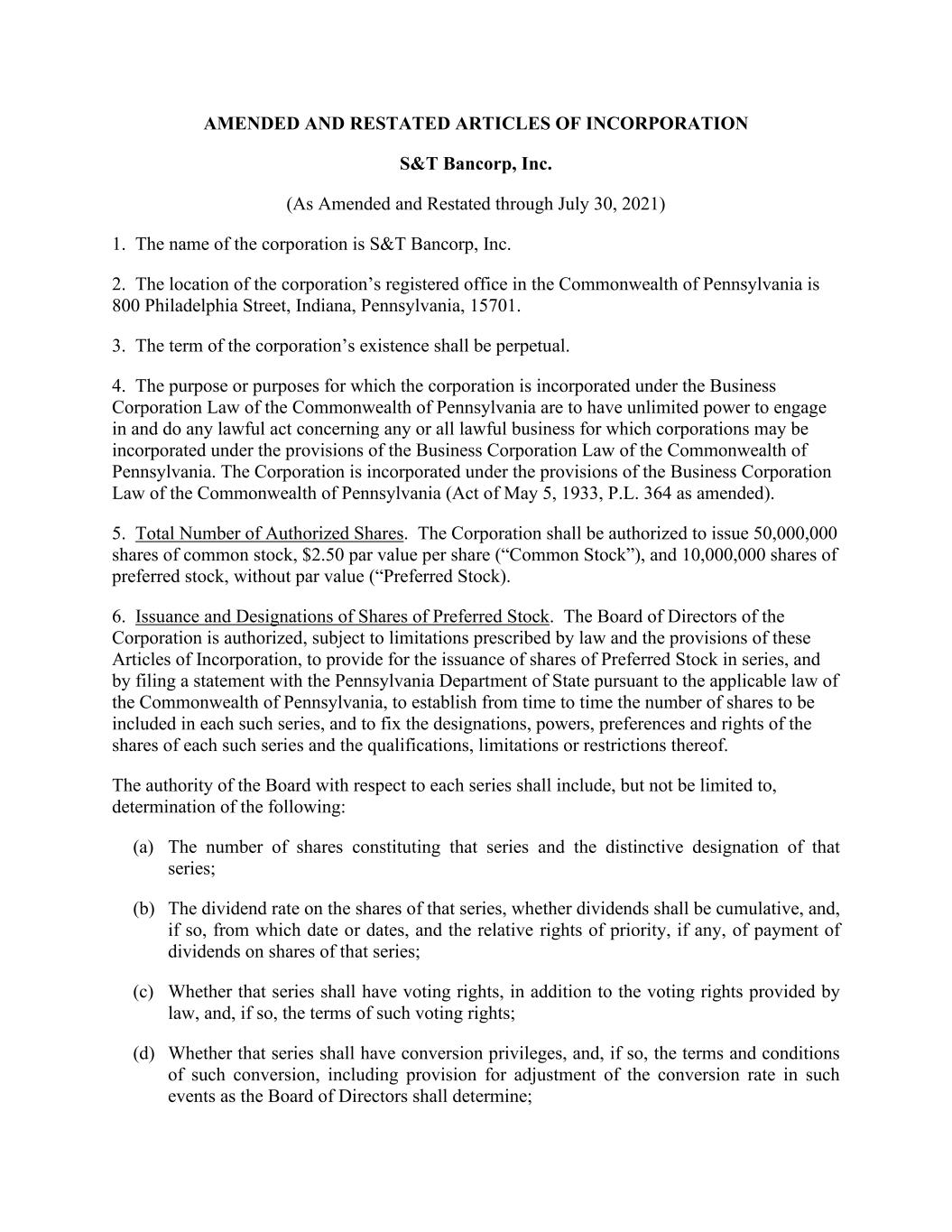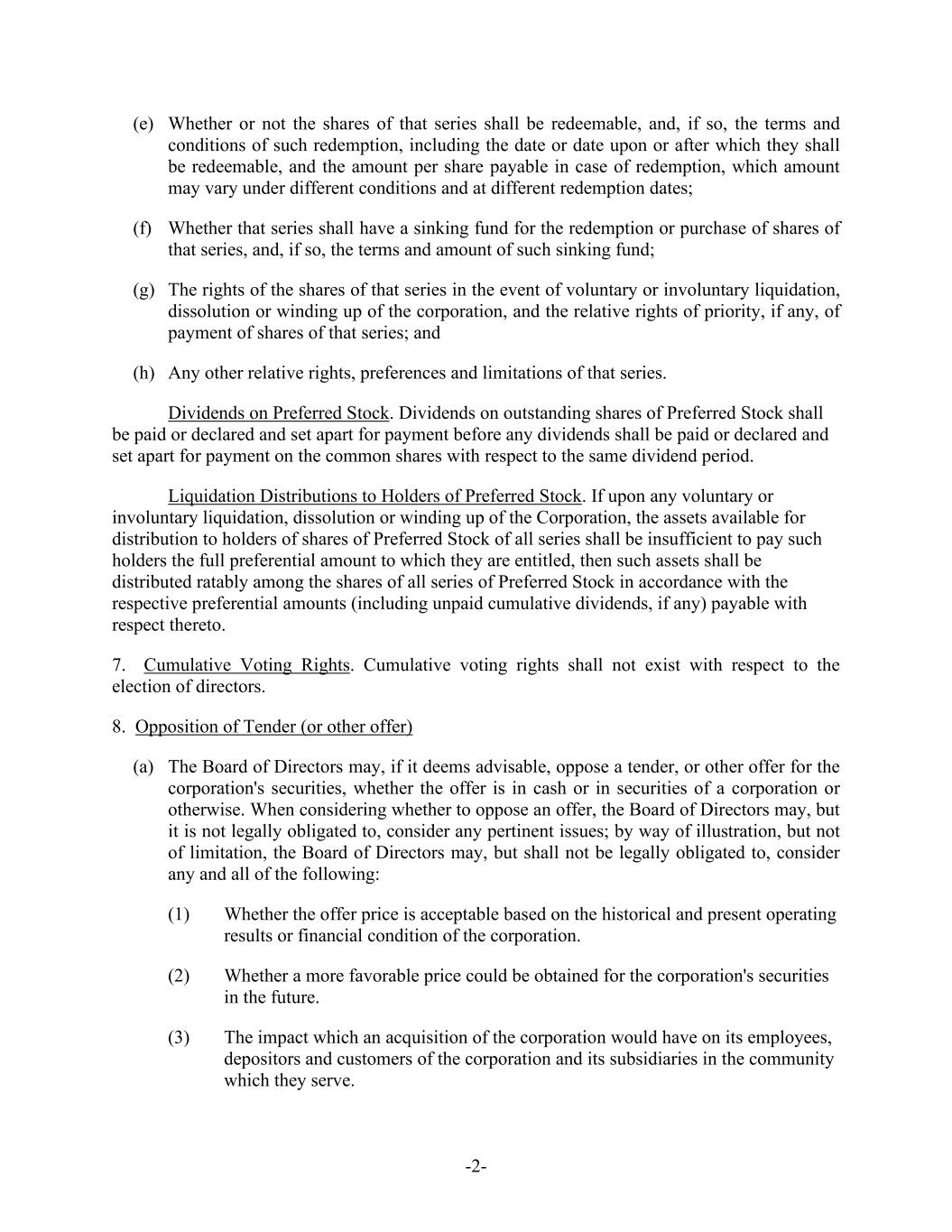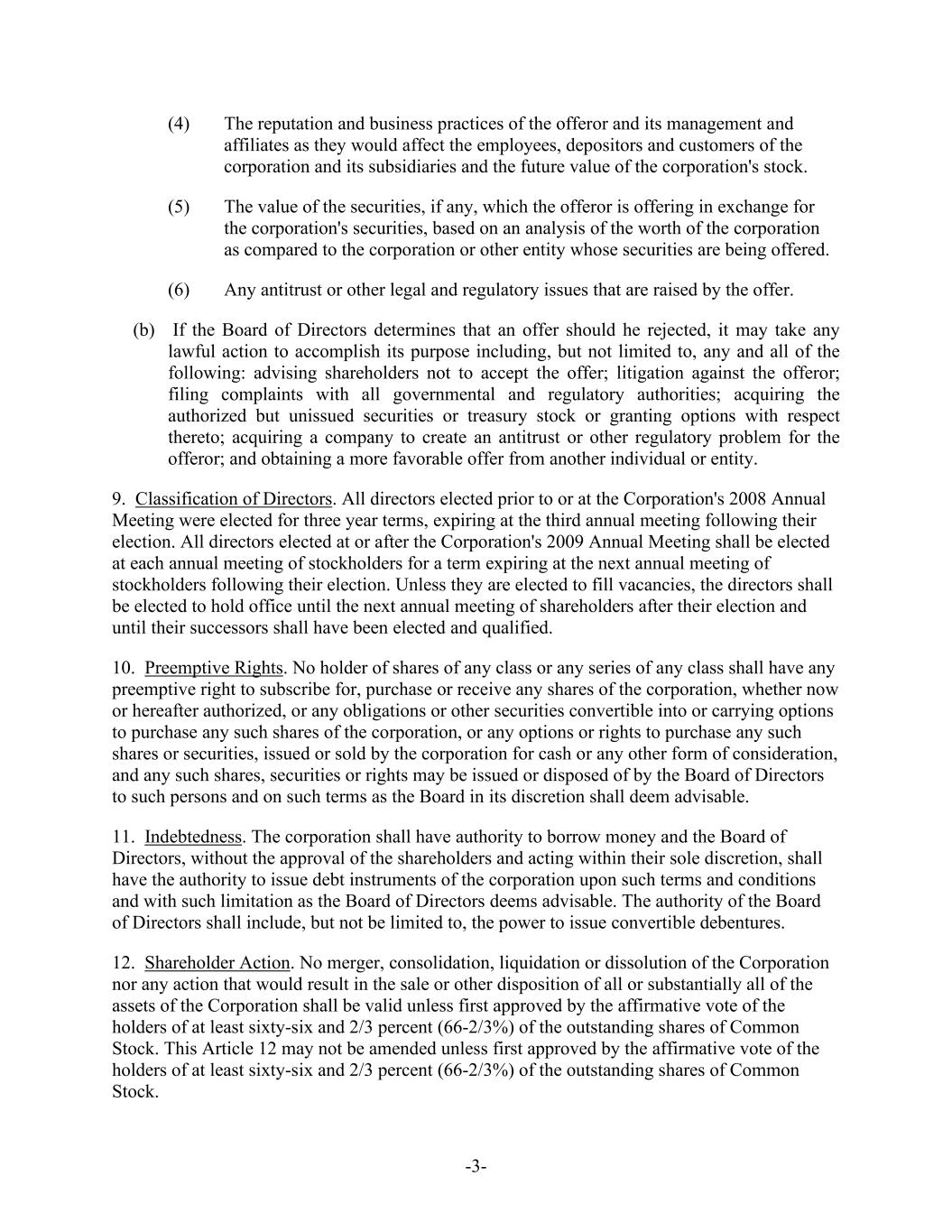Attached files
| file | filename |
|---|---|
| 10-Q - 10-Q - S&T BANCORP INC | stba-20210630.htm |
| EX-32.1 - EX-32.1 - S&T BANCORP INC | exhibit32q2-2021.htm |
| EX-31.2 - EX-31.2 - S&T BANCORP INC | exhibit312q2-2021.htm |
| EX-31.1 - EX-31.1 - S&T BANCORP INC | exhibit311q2-2021.htm |

AMENDED AND RESTATED ARTICLES OF INCORPORATION S&T Bancorp, Inc. (As Amended and Restated through July 30, 2021) 1. The name of the corporation is S&T Bancorp, Inc. 2. The location of the corporation’s registered office in the Commonwealth of Pennsylvania is 800 Philadelphia Street, Indiana, Pennsylvania, 15701. 3. The term of the corporation’s existence shall be perpetual. 4. The purpose or purposes for which the corporation is incorporated under the Business Corporation Law of the Commonwealth of Pennsylvania are to have unlimited power to engage in and do any lawful act concerning any or all lawful business for which corporations may be incorporated under the provisions of the Business Corporation Law of the Commonwealth of Pennsylvania. The Corporation is incorporated under the provisions of the Business Corporation Law of the Commonwealth of Pennsylvania (Act of May 5, 1933, P.L. 364 as amended). 5. Total Number of Authorized Shares. The Corporation shall be authorized to issue 50,000,000 shares of common stock, $2.50 par value per share (“Common Stock”), and 10,000,000 shares of preferred stock, without par value (“Preferred Stock). 6. Issuance and Designations of Shares of Preferred Stock. The Board of Directors of the Corporation is authorized, subject to limitations prescribed by law and the provisions of these Articles of Incorporation, to provide for the issuance of shares of Preferred Stock in series, and by filing a statement with the Pennsylvania Department of State pursuant to the applicable law of the Commonwealth of Pennsylvania, to establish from time to time the number of shares to be included in each such series, and to fix the designations, powers, preferences and rights of the shares of each such series and the qualifications, limitations or restrictions thereof. The authority of the Board with respect to each series shall include, but not be limited to, determination of the following: (a) The number of shares constituting that series and the distinctive designation of that series; (b) The dividend rate on the shares of that series, whether dividends shall be cumulative, and, if so, from which date or dates, and the relative rights of priority, if any, of payment of dividends on shares of that series; (c) Whether that series shall have voting rights, in addition to the voting rights provided by law, and, if so, the terms of such voting rights; (d) Whether that series shall have conversion privileges, and, if so, the terms and conditions of such conversion, including provision for adjustment of the conversion rate in such events as the Board of Directors shall determine;

-2- (e) Whether or not the shares of that series shall be redeemable, and, if so, the terms and conditions of such redemption, including the date or date upon or after which they shall be redeemable, and the amount per share payable in case of redemption, which amount may vary under different conditions and at different redemption dates; (f) Whether that series shall have a sinking fund for the redemption or purchase of shares of that series, and, if so, the terms and amount of such sinking fund; (g) The rights of the shares of that series in the event of voluntary or involuntary liquidation, dissolution or winding up of the corporation, and the relative rights of priority, if any, of payment of shares of that series; and (h) Any other relative rights, preferences and limitations of that series. Dividends on Preferred Stock. Dividends on outstanding shares of Preferred Stock shall be paid or declared and set apart for payment before any dividends shall be paid or declared and set apart for payment on the common shares with respect to the same dividend period. Liquidation Distributions to Holders of Preferred Stock. If upon any voluntary or involuntary liquidation, dissolution or winding up of the Corporation, the assets available for distribution to holders of shares of Preferred Stock of all series shall be insufficient to pay such holders the full preferential amount to which they are entitled, then such assets shall be distributed ratably among the shares of all series of Preferred Stock in accordance with the respective preferential amounts (including unpaid cumulative dividends, if any) payable with respect thereto. 7. Cumulative Voting Rights. Cumulative voting rights shall not exist with respect to the election of directors. 8. Opposition of Tender (or other offer) (a) The Board of Directors may, if it deems advisable, oppose a tender, or other offer for the corporation's securities, whether the offer is in cash or in securities of a corporation or otherwise. When considering whether to oppose an offer, the Board of Directors may, but it is not legally obligated to, consider any pertinent issues; by way of illustration, but not of limitation, the Board of Directors may, but shall not be legally obligated to, consider any and all of the following: (1) Whether the offer price is acceptable based on the historical and present operating results or financial condition of the corporation. (2) Whether a more favorable price could be obtained for the corporation's securities in the future. (3) The impact which an acquisition of the corporation would have on its employees, depositors and customers of the corporation and its subsidiaries in the community which they serve.

-3- (4) The reputation and business practices of the offeror and its management and affiliates as they would affect the employees, depositors and customers of the corporation and its subsidiaries and the future value of the corporation's stock. (5) The value of the securities, if any, which the offeror is offering in exchange for the corporation's securities, based on an analysis of the worth of the corporation as compared to the corporation or other entity whose securities are being offered. (6) Any antitrust or other legal and regulatory issues that are raised by the offer. (b) If the Board of Directors determines that an offer should he rejected, it may take any lawful action to accomplish its purpose including, but not limited to, any and all of the following: advising shareholders not to accept the offer; litigation against the offeror; filing complaints with all governmental and regulatory authorities; acquiring the authorized but unissued securities or treasury stock or granting options with respect thereto; acquiring a company to create an antitrust or other regulatory problem for the offeror; and obtaining a more favorable offer from another individual or entity. 9. Classification of Directors. All directors elected prior to or at the Corporation's 2008 Annual Meeting were elected for three year terms, expiring at the third annual meeting following their election. All directors elected at or after the Corporation's 2009 Annual Meeting shall be elected at each annual meeting of stockholders for a term expiring at the next annual meeting of stockholders following their election. Unless they are elected to fill vacancies, the directors shall be elected to hold office until the next annual meeting of shareholders after their election and until their successors shall have been elected and qualified. 10. Preemptive Rights. No holder of shares of any class or any series of any class shall have any preemptive right to subscribe for, purchase or receive any shares of the corporation, whether now or hereafter authorized, or any obligations or other securities convertible into or carrying options to purchase any such shares of the corporation, or any options or rights to purchase any such shares or securities, issued or sold by the corporation for cash or any other form of consideration, and any such shares, securities or rights may be issued or disposed of by the Board of Directors to such persons and on such terms as the Board in its discretion shall deem advisable. 11. Indebtedness. The corporation shall have authority to borrow money and the Board of Directors, without the approval of the shareholders and acting within their sole discretion, shall have the authority to issue debt instruments of the corporation upon such terms and conditions and with such limitation as the Board of Directors deems advisable. The authority of the Board of Directors shall include, but not be limited to, the power to issue convertible debentures. 12. Shareholder Action. No merger, consolidation, liquidation or dissolution of the Corporation nor any action that would result in the sale or other disposition of all or substantially all of the assets of the Corporation shall be valid unless first approved by the affirmative vote of the holders of at least sixty-six and 2/3 percent (66-2/3%) of the outstanding shares of Common Stock. This Article 12 may not be amended unless first approved by the affirmative vote of the holders of at least sixty-six and 2/3 percent (66-2/3%) of the outstanding shares of Common Stock.
